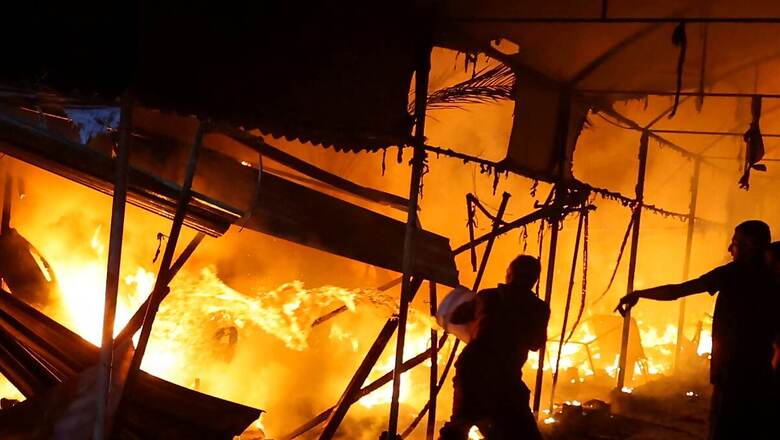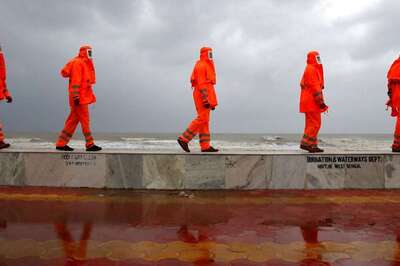
views
Amid the worsening humanitarian situation in Gaza, US Vice President Kamala Harris has voiced concern about the Palestinian enclave, saying that Israel must urgently do more to facilitate the flow of aid to those in need.
This came after UN humanitarians said on Friday that aid entering the Gaza Strip is at its lowest level in months, and both the north and south of the region are at “breaking point.” “The UN reports that no food has entered northern Gaza in nearly 2 weeks. Israel must urgently do more to facilitate the flow of aid to those in need. Civilians must be protected and must have access to food, water, and medicine. International humanitarian law must be respected,” Harris said in a post on X.
The UN reports that no food has entered northern Gaza in nearly 2 weeks. Israel must urgently do more to facilitate the flow of aid to those in need. Civilians must be protected and must have access to food, water, and medicine. International humanitarian law must be respected.— Vice President Kamala Harris (@VP) October 13, 2024
Northern Gaza
Harris’s post came as the UN deputy spokesperson Farhan Haq said that critical aid lifelines into northern Gaza have been cut off, and no food aid has entered there since 1 October. According to several reports, main crossings into the north have been closed and will be inaccessible if the current escalation continues. World Food Programme (WFP) distributed its last remaining food stocks in the north to partners and kitchens sheltering newly displaced families.
Haq said the situation in the south is also “at breaking point”. No food distributions are taking place, while bakeries are struggling to secure wheat flour, putting them at risk of shutting down any day. “Aid entering Gaza is at its lowest level in months. No one has received food parcels in this month due to constrained access of aid supplies,” he said.
‘Starve out’ Plan
According to The Associated Press, Israeli Prime Minister Benjamin Netanyahu is examining a plan to seal off humanitarian aid to northern Gaza in an attempt to starve out Hamas militants. Experts believe that if such a plan is implemented, it could trap without food or water hundreds of thousands of Palestinians unwilling or unable to leave their homes.
Israel has issued many evacuation orders for the north throughout the yearlong war, the most recent of which was Sunday. The plan proposed to Netanyahu and the Israeli parliament by a group of retired generals would escalate the pressure, giving Palestinians a week to leave the northern third of the Gaza Strip, including Gaza City, before declaring it a closed military zone.
Those who remain would be considered combatants and denied food, water, medicine and fuel, according to a copy of the plan given to the Associated Press by its chief architect, who says the plan is the only way to break Hamas in the north and pressure it to release the remaining hostages.
Families forced to flee
The UN Children’s Fund (UNICEF) last week said sudden displacement orders in the north are once again affecting tens of thousands of vulnerable boys and girls. OCHA warned that most displacement is now occurring in the north, where no tents are available to support families that have been newly uprooted.
The latest developments in the North Gaza governorate have forced the suspension of protection services, the closure of malnutrition treatment services, and the shutting down of five temporary learning spaces. UN humanitarians have continued to warn that the situation for civilians is getting worse as the Israeli military renews its push into the north, where some 400,000 people face evacuation orders.
“Over the last week, the Israeli military has intensified operations in north Gaza, further severing the area from the rest of the Gaza Strip and risking afresh the lives of civilians in the areas,” said Ravina Shamdasani, spokesperson for the UN human rights office, OHCHR. “Intense strikes, shelling, quadcopter shootings and ground incursions have occurred over the past days, hitting residential buildings and groups of people, causing numerous casualties and once again, mass displacement of Palestinians in the area.”
‘Lack of access to the enclave’
As UN aid agencies and partners prepare to roll out the second phase of the mass polio vaccination campaign next week, the World Health Organization (WHO) Representative for the Occupied Palestinian Territories, Dr. Rik Peeperkorn, underscored the impact of a chronic lack of humanitarian access to the enclave and, in particular, the north.
“Many of the hospitals in the north are running out of fuel. Most of the UN and humanitarian missions are not happening to the north. They’re running out of a a few specific medical supplies and we are one year in this crisis,” Dr. Peeperkorn said, as he confirmed that three relief missions north of Wadi Gaza had not made it this week. “So, we request again…that these humanitarian missions to the north, wherever, to the south, they need to happen.”
(With agency inputs)




















Comments
0 comment